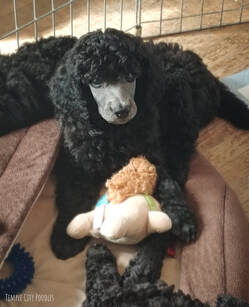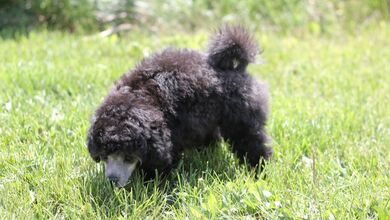So, we're getting a puppy. Now what?
|
There is nothing more fun than bringing home a bouncy ball of fuzz. That being said, it can be a challenge to get through typical puppy behaviours. Chewing, housetraining, and the 'puppy training blues' are all part of this exciting, scary, and very addictive rollercoaster we call dog ownership. Here are some tips to prepare you and your family for a new piranha to make it the best experience possible. |
Have supplies on hand well in advance - Make sure you have everything you need before the puppy comes home, so you can focus on keeping the puppy's first few days relaxed and organized. We highly recommend keeping a 3-month supply of dog food (or roughly 40-50 lbs) on hand at all times. For a list of puppy essentials, see our Puppy Shopping List here: Supply List for Your Puppy
Puppy-proof your home - Puppies are very curious creatures and love to explore their environment, most especially by chewing. Make sure the following is out of reach:
- Live plants
- Electric cords (or access to them--block off behind the T.V., etc.)
- Paperwork (puppies love to shred)
- Small items such as paperclips, pins, earrings, etc. Inspect the floor regularly and keep it swept/vacuumed.
- Cardboard boxes--another thing puppies love to destroy.
- Small animals
- Chemicals such as bleach, antifreeze, and paint.
- Stair cases, vents, balconies, etc. Any place they could fall off of or get trapped in.
- Live plants
- Electric cords (or access to them--block off behind the T.V., etc.)
- Paperwork (puppies love to shred)
- Small items such as paperclips, pins, earrings, etc. Inspect the floor regularly and keep it swept/vacuumed.
- Cardboard boxes--another thing puppies love to destroy.
- Small animals
- Chemicals such as bleach, antifreeze, and paint.
- Stair cases, vents, balconies, etc. Any place they could fall off of or get trapped in.
Research, research, research! - There is always more to learn. As adorable as they are, puppies can be frustrating, and it's critical to know exactly how their brains work so you can teach them in a way they will understand. I highly recommend watching videos, reading books, and even attending seminars to learn as much as you possibly can about bad behaviours and how to prevent and redirect them. Your puppy will thank you. I recommend the following resources:
- When Pigs Fly Dog Training (book)
- Zak George's Dog Training Revolution (YouTube channel & book)
- Puppy Culture (DVDs)
- Positively Dog Training by Victoria Stilwell (website, YouTube, and book)
- When Pigs Fly Dog Training (book)
- Zak George's Dog Training Revolution (YouTube channel & book)
- Puppy Culture (DVDs)
- Positively Dog Training by Victoria Stilwell (website, YouTube, and book)
Set aside time for the new arrival - The first few days can be uneasy for a young puppy. This is his/her first time away from their littermates and mother. If possible, take a few days off of work to help your puppy settle into the family. There will also be a few noisy, and sometimes sleepless nights if the puppy cries during the night. Building a solid foundation for this puppy is essential. They will need some time to get used to the new schedule, to learn to go outside, adjust to their new family members, etc., and it is much easier when he/she has someone home to guide them through it.
Choose a vet and make an appointment for your puppy's first vet check - Having a solid relationship with a veterinarian is crucial. Get to know their practices, if they offer 24/7 calls for emergencies, what their prices are for certain procedures (such as dentals and spay/neuter surgeries), etc. Make sure you choose a vet who is supportive, knowledgeable, within your price range, and who you overall feel good about. I highly recommend scheduling your puppy's first vet check/vaccinations before they even come home to ensure you have a veterinarian lined up. Some clinics are not accepting new clients or are short-staffed and are scheduling out several weeks, so it is important to have this taken care of before it is needed. I also recommend having an emergency clinic picked out (if your regular vet does not take 24/7 calls) to be prepared for anything that may arise.
Find a Positive Reinforcement trainer in your area -
Limit visitors - This is a very big life change for a puppy. New people, sounds, smells -- it can be overwhelming! Keep your home as quiet as possible, and prevent visitors from coming to meet the puppy until they are comfortable with their new surroundings. Until the puppy is fully vaccinated, take extra precautions-- have visitors wash their hands, remove their shoes and place them out of reach, etc.
Bed time - Withhold food and water for at least one hour before you plan to put the puppy to bed. Make sure your puppy urinates/defecates first and give them 30-60 minutes to run, play, and get those wiggles out. For another 10 minutes or so, start to calm things down by offering thing a Kong toy with a few treats inside (not too many, you don't want them to need to potty during the night), do a small training session to work their mind, carry them around the house and rock them slowly, etc. You want their heart rate to slow down, their muscles to relax, and for them to feel tired enough to go to sleep fairly quickly. Once it's time to put them in the kennel, toss a yummy chew, such as a raw bone or roll of cod skin, into their kennel and let them enter by their own will. There will inevitably be fussing and whining for a bit, but don't give in. The puppy must learn that bed time is bed time, and that whining and barking doesn't get them what they want. The puppy will need to be kennelled for bed time until he/she is housetrained and can hold it during the night. Nobody wants to roll over in a warm puddle at 3 AM!
Begin a routine - It is much easier to housetrain a puppy and accustom them to your lifestyle if there is a routine in place. Use these guidelines to build your schedule:
- Take the puppy outside first thing in the morning, after each meal, after waking up, and right before bedtime.
- Feed your puppy 3x a day. Puppies need a regular source of energy as their metabolism is high.
- Allow time for your puppy to explore, wander, sniff, and free run.
- Training sessions should be short and upbeat. Plan for 3-5 minute sessions at first, eventually working up to longer sessions.
- Aim for small social outings at least once a week. Puppyhood is a critical time for cognitive development, and the more quality exposure your puppy receives, the better. It is more important for a puppy to learn to ignore distractions and focus on you, than it is for the puppy to interact with their environment.
- Allow your puppy to rest after feeding time to prevent an upset stomach. Provide a chew treat (bully sticks are a favourite) in their crate, brush their coat, etc.
Quality Poodles, Toy Poodle Breeder, Alberta Canada, Miniature Poodles, Standard Poodles, Health Testing, CKC Registered, Canadian Poodle Breeder, Health Tested, Agility, Poodle Puppies, Cream Toy Poodle, White Toy Poodle, Silver Toy Poodle, Brown Toy Poodle, Chocolate Toy Poodle, Silver Beige Toy Poodle, Cafe au Lait Toy Poodle, Apricot Toy Poodle, Blue Toy Poodle, White Standard Poodle, Black Poodle, Calgary, Edmonton, Hypoallergenic, Nonshedding, Non-shedding, Non shedding, Canadian Kennel Club, Puppy Culture, Puppy Culture Breeder, PuppyCulture, PC Breeder, PC Puppies, Medicine Hat, Regina, Saskatoon, Toronto, Red Deer, Reputable, Kamloops, Cranbrook, Victoria, Vancouver, Yellow Knife, Grande Prairie, Ontario, Saskatchewan, Manitoba, ISO, Winnipeg, Utah, Montana, Great Falls, US, AKC, Washington, Idaho, Billings, New Brunswick, Nova Scotia, St. Johns, Quebec, Montreal, Prince Edward Island, PEI, Poodle Puppies for Sale, Spoo, Quality Poodles for sale, Responsible Breeders of Canada, Western Canada, Central Canada, Poodle Club of Canada, Poodle Club of Alberta
Proudly powered by Weebly


